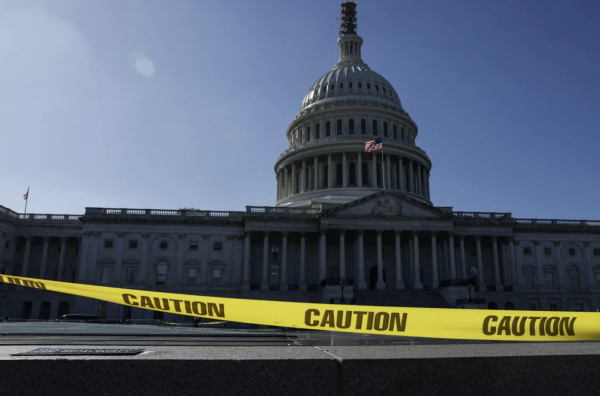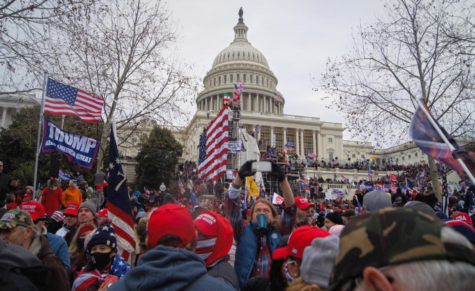Trump’s success sparks anxiety and new hope
It appears the Westminster campus is slowly returning to normal. Though the articles published in this month’s issue of the Bi-Line may spur another wave of debate, it seems as though, for the most part, things have calmed down. Across the nation, however, many are still reeling from the results of the 2016 election.
Arriving to school the day after the election, there was a tangible uneasiness in the air. Everyone of us could feel the 800 ton elephant in the room that was on everybody’s minds called the election of 2016. Passionate students on both sides of the political spectrum found themselves in tense and heated debates with one another. Though most of these debates unfortunately degraded into name calling and vicious behavior towards people who were even the best of friends the week before. For a seemingly endless week, a student body was divided by whether one chose to wear a “Make America Great Again!” sticker on one’s shirt or an “I’m With Her” label on one’s MacBook.
Now, some still find themselves cheering for their President-elect, others still mourn over Trump’s ascension to the Presidency. Regardless, the election has finally come to an end. The United States of America has elected Donald J. Trump as the next president of our country.
In the wake of this incredibly divisive election, it is time to stop the violence, the name calling, and the accusations on both sides. Regardless of the protests or riots in cities across the country, this coming January President-Elect Donald J. Trump will be packing up his penthouse in Trump Tower, and moving into the White House. Clever cries and slogans will not stop this.
This election has also brought the electoral college as a process into the national light, raising a new conversation about the complicated system through which we as Americans, elect our President. For those chanting “not my president”, it is important to understand the electoral process this country has followed for the past 56 elections, and why, technically, Donald Trump is your next president, regardless of whether or not he represents your political beliefs or vision of America.
In short, the electoral college is a system that blends popular vote and states rights into a single method for selecting the commander in chief. Each state receives at least three votes, all of which represents their total seats in Congress. As a state gets larger, the more House of Representative seats it receives and electoral votes as a result. For example, the most populous state, California, has 55 electoral votes while the less populous states, such as North Dakota, receives 3 votes. (the District of Columbia also has three electoral votes) In total, there are 538 electoral votes present in the US and it takes 270 to choose a President. Whenever you or I vote in a Presidential election, we are technically not voting for our next President, rather we are voting for our state’s electors to vote for the candidate we deem fit to lead our nation. As a result, it is theoretically possible to elect a President with around 22% of the popular vote, demonstrating a key issue many Americans see towards the electoral system. Five times in American history (1824, 1876, 1888, 2000, and most recently in 2016) has a candidate ascended to the Presidency, but did not win the popular vote.
Many protesters have called upon the abolition of the electoral college due to its ‘undemocratic’ nature. Critics have called the system ‘outdated’ and believe its abolition is the first step towards a more democratic election process in the United States of America. Days before the 2012 election, Donald Trump himself stated, “The electoral college is a disaster for a democracy.” on his Twitter page. Four years later, the very system he labelled as a ‘disaster’ decided that he would become the 45th President of the United States.
As a result of this recent election, the electoral college has been brought into the national conversation as people take sides on the issue. Whether you believe it is a beneficial system, in the defense of states rights and smaller populations which are marginalized by larger states, or if it is an undemocratic and repressive process which prevents the general population itself from directly electing the President, it is an essential conversation to be had if we as a nation are to move past this election and head towards the future, as one country.
The divisiveness of the electoral college is not the only thing which has fractured our country into pieces. The real tragedy of this election comes from its abandonment of civil discourse. The very nature of the candidates, and their almost child-like dynamic, have caused the sharpest divides. While the American Civil War brought brother against brother on the battlefield, this election has caused brother to insult brother on their Facebook feeds.
The Democratic Candidate, Hillary Clinton, has been criticized for her mishandling of classified emails, the overall trustworthiness of her character, and the Benghazi attacks in 2012 during her tenure as Secretary of State. The now President-Elect Donald Trump has been scrutinized for his bombastic behavior during professional outings, such as name calling and liberal use of the always clever “sad” during Presidential debates, in addition to his overall lack of experience in any political field.
Hillary Clinton represented the status-quo of American politics, plagued with cronyism and collusion, particularly in regards to the DNC and its mistreatment towards the Bernie Sanders campaign, according to leaked emails. Donald Trump’s brash personality and the resulting lewd comments had him labelled as a misogynistic racist, with critics citing his offensive comments towards women in 2005 and various controversial statements during his bid for the Presidency. Mr. Trump’s transition to the White House has also generated negative reactions due to the past occupation of his Chief Advisor and his running mate’s strained relations with the LGBT community during his service as Governor of Indiana. Either way, these controversies polarized voters, and pushed many away from both candidates, while causing a serious divide between even us as students leading up to, and in the aftermath of, this 2016 election.
Nonetheless, for better or worse, this is the political system we as a country have created and maintained. This election has hopefully opened the eyes of many across the nation and be looked back upon as a defining moment in American history. It has highlighted the issues of having such a rigid two party system, the drastic impact of modern media, and the importance of voter turnout. Now more than ever, it is time for us Americans to look at the this problematic political arena we have created, and figure out how we can change it for the better over these next four years.




